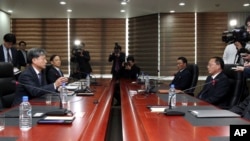North and South Korea have held high-level talks for the first time in nearly two years, with both sides expressing a desire to improve long-strained ties.
The vice ministerial-level meeting was held Friday at the Kaesong industrial complex, just north of the tense demilitarized zone separating the two countries.
South Korean Vice Unification Minister Hwang Boo-gi and his North Korean counterpart, Jon Jong Su, struck an optimistic tone as they shook hands at the beginning of the dialogue.
"When we make the first step, it is important to keep walking straight. Let's make the right step on the first road, so that we can open a path to reunification," Hwang said.
"Distrust and confrontation have run deep and the wall between us has been getting high. Let's break down that barrier and pave the ground [for reunification]," replied Jon.
The talks were agreed to in August as part of a deal that ended a standoff over a landmine incident that wounded two South Korean soldiers near the border.
There is no official agenda for the talks, and no significant breakthroughs are expected, though each side is thought to have clear goals.
Pyongyang is expected to push for the resumption of South Korean tours to its scenic Mount Kumgang resort. The South canceled the tours in 2008 after a South Korean was killed there.
Seoul wants the North to agree to more frequent reunions between North and South Koreans separated by the two countries' 1950s conflict. The last such meeting was held in October.
There are also several areas of discussion that are likely to be off-limits, including North Korea's nuclear and missile programs.
On Thursday, North Korean leader Kim Jong Un suggested his isolated government has developed a hydrogen bomb, which would represent a significant technological advance.
South Korean and Western officials said there is no evidence to support Kim's claims.
North Korea is under strict economic sanctions imposed by the U.N. Security Council for conducting three underground nuclear tests in 2006, 2009 and 2013.
Another sensitive issue not likely to be discussed is North Korea's human rights record.
On Thursday, the U.N. Security Council met to discuss North Korea's alleged human rights violation for only the second time in its history.
The U.S. ambassador to the U.N., Samantha Power, told the council that the North's abuses represented a "level of horror unrivalled in the world."
U.N. High Commissioner for Human Rights Zeid Ra'ad al Hussein said he supported a call by the U.N. General Assembly urging the Security Council to refer the situation in North Korea to the International Criminal Court, saying it is “essential, given the scale and extreme gravity of the allegations."





